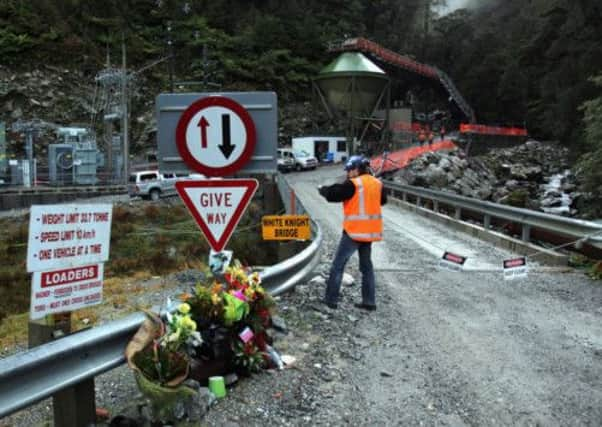Judge convicts company over New Zealand mine deaths


Judge Jane Farish found that Pike River Coal failed to ensure the safety of its workers. The now-bankrupt company did not defend itself against the charges.
An earlier government investigation found the company ignored 21 warnings that methane gas had accumulated to explosive levels in the mine, and that it was exposing miners to unacceptable risks as it strove to meet financial targets.
Advertisement
Hide AdAdvertisement
Hide AdThe company will be sentenced in July. Each of the charges comes with a maximum penalty of $NZ 250,000 (£138,000).
Former chief executive Peter Whittall has pleaded not guilty to 12 charges. His case has yet to be heard.
Last night, relatives of the men who died in the accident said they were angry that the company had “walked away” from the disaster after declaring itself bankrupt.
And they have called for a change in the law to allow the company to be prosecuted for manslaughter.
Malcolm Campbell, 25, from St Andrews, had worked at the mine for two years and was due to marry his 23-year-old fiancée, Amanda Shields. Former Perth Grammar pupil Peter Monk, 40, who previously worked on oil rigs, moved to New Zealand in 2008 to be near his mother and sister who had emigrated there.
Releasing her interim decision yesterday, Judge Farish said: “In this case, there were fundamental breaches of the Health and Safety in Employment Act which led to the unnecessary deaths of 29 men.”
The judge’s full decision will be released in two weeks.
Outside court, the spokesman for most of the victims’ families, Bernie Monk, welcomed the judgment, saying it contained “a lot of punch”.
It was important that all 29 families had the chance to give victim-impact statements to “hammer home” their feelings of losing their loved ones, he said.
Advertisement
Hide AdAdvertisement
Hide AdMr Monk, whose son Michael died in the blast, said families wanted law changes to prevent companies from declaring themselves bankrupt and walking away from such a disaster. That included manslaughter charges for companies. “If this thing happens again, we don’t want other families to face what we have,” he said.
Despite pressure from families of the dead, their bodies have still to be recovered from the mine.
Judge Farish said that ventilation of the gassy mine was “of crucial importance in terms of ensuring the safety of those men working underground”. The charges related to how the company managed the risk of explosions along with health and safety management for contractors, subcontractors and their employees in the underground west coast coalmine.
Experts found the explosion was most likely caused by ignition of a large volume of methane, Judge Farish said.
“Explosion is a well-known hazard in underground coalmining and such tragedies regularly take the lives of workers around the world,” she said.
“The key to controlling these tragedies is to keep in mind that, with the right confluence of factors, an explosion can occur.”
During last month’s hearing, Australian mine safety expert David Reece said Pike’s methane and ventilation management was inadequate despite being the “two hallmarks” to managing underground coal mines.
Last July, Pike’s lawyer told the court it would not defend the charges and would take no part in the legal process other than appearing at sentencing if charges were proved.